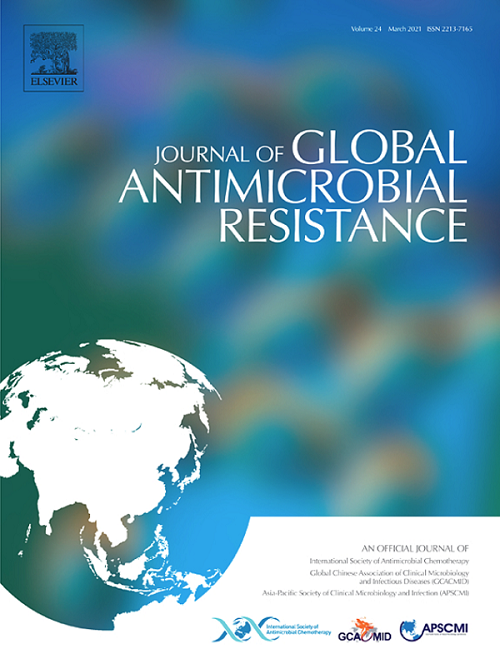Exploring households’ access and utilization of antibiotics for their livestock: A cross-sectional study in Ghana and Burkina Faso
IF 3.2
3区 医学
Q2 INFECTIOUS DISEASES
引用次数: 0
Abstract
Objectives
The irrational use of antibiotics in animals contributes to antimicrobial resistance. This study examines factors influencing access to veterinary services and antibiotic use among livestock-owning households in the Asante Akim North District, Ghana, and the Nouna District, Burkina Faso.
Methods
In Burkina Faso, a simple randomization was carried out, whereas in Ghana, double-stage cluster sampling was applied. A cross-sectional survey collected sociodemographic and economic data, along with information on veterinary access and antibiotic use. The data collection was conducted between February and March 2023 in Ghana, and from July to November 2023 in Burkina Faso. Data analysis used descriptive statistics and logistic regressions.
Results
Among the sampled households, 415 (37.3%) in Ghana and 521 (51.5%) in Burkina Faso owned livestock. Antibiotics were administered to both sick and healthy animals, mainly amoxicillin (22%) in Ghana and tetracycline (7.25%) in Burkina Faso. In Ghana, individuals with no religious affiliation (adjusted odds ratio [aOR] = 0.06, 95% confidence interval [CI] = 0.01–0.48, P = 0.008), and semi-urban residents (aOR = 0.34, 95% CI = 0.21–0.54, P = > 0.001) had lower access to veterinary services, whereas those in the highest socioeconomic quartile had greater access (aOR = 3.38, 95% CI = 1.82–6.27, P = > 0.001). In Burkina Faso, socioeconomic status (SES) and residence are confounding factors. Stratified analysis showed semi-urban residents and wealthier groups had better veterinary access, unlike rural populations.
Conclusions
There is a need to address antibiotic use through stronger regulations, improved access to veterinary services, and targeted education programs to prevent antimicrobial resistance (AMR) among populations in West Africa.
探讨家庭牲畜抗生素的获取和使用情况:加纳和布基纳法索的一项横断面研究。
背景:抗生素在动物中的不合理使用是产生耐药性的原因之一。本研究考察了影响加纳Asante Akim北区和布基纳法索Nouna区的畜牧家庭获得兽医服务和抗生素使用的因素。方法:在布基纳法索进行简单随机化,而在加纳采用双阶段整群抽样。一项横断面调查收集了社会人口和经济数据,以及关于兽医获取和抗生素使用的信息。数据收集于2023年2月至3月在加纳进行,于2023年7月至11月在布基纳法索进行。数据分析采用描述性统计和逻辑回归。结果:在抽样家庭中,加纳415户(37.3%)和布基纳法索521户(51.5%)拥有牲畜。对患病和健康动物均使用抗生素,主要是阿莫西林(加纳22%)和四环素(布基纳法索7.25%)。在加纳,无宗教信仰的个体(aOR: 0.06, 95% CI 0.01 - 0.48, p= 0.008)和半城市居民(aOR: 0.34, 95% CI 0.21 - 0.54, p= >0.001)获得兽医服务的机会较低,而社会经济最高四分位数的个体获得兽医服务的机会较高(aOR: 3.38, 95% CI 1.82 - 6.27, p= >0.001)。在布基纳法索,社会经济地位和居住地是混杂因素。分层分析显示,与农村人口不同,半城市居民和富裕群体有更好的兽医服务。结论:有必要通过加强监管、改善兽医服务的可及性和有针对性的教育项目来解决抗生素使用问题,以预防西非人群的抗生素耐药性。
本文章由计算机程序翻译,如有差异,请以英文原文为准。
求助全文
约1分钟内获得全文
求助全文
来源期刊

Journal of global antimicrobial resistance
INFECTIOUS DISEASES-PHARMACOLOGY & PHARMACY
CiteScore
8.70
自引率
2.20%
发文量
285
审稿时长
34 weeks
期刊介绍:
The Journal of Global Antimicrobial Resistance (JGAR) is a quarterly online journal run by an international Editorial Board that focuses on the global spread of antibiotic-resistant microbes.
JGAR is a dedicated journal for all professionals working in research, health care, the environment and animal infection control, aiming to track the resistance threat worldwide and provides a single voice devoted to antimicrobial resistance (AMR).
Featuring peer-reviewed and up to date research articles, reviews, short notes and hot topics JGAR covers the key topics related to antibacterial, antiviral, antifungal and antiparasitic resistance.
 求助内容:
求助内容: 应助结果提醒方式:
应助结果提醒方式:


